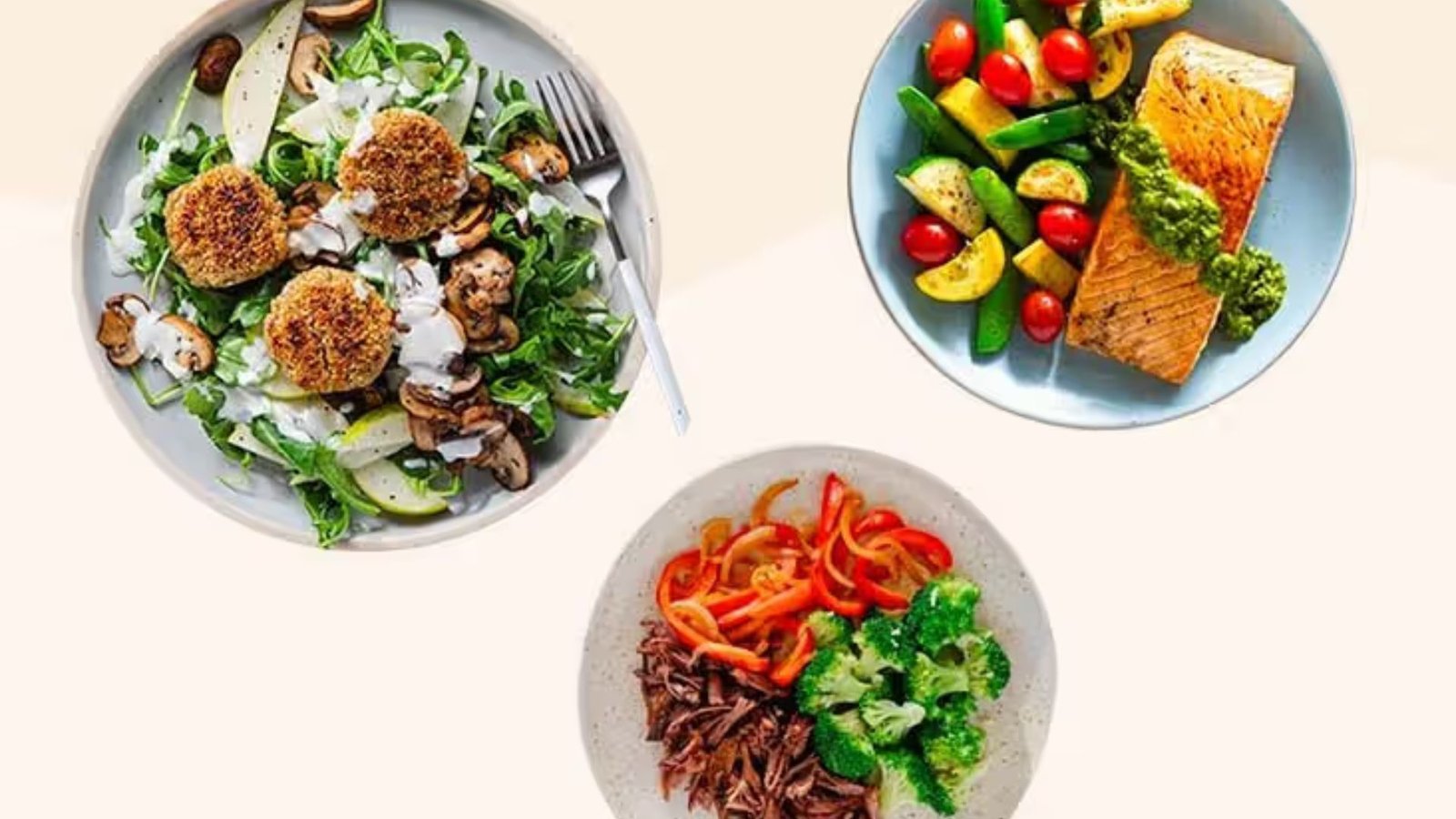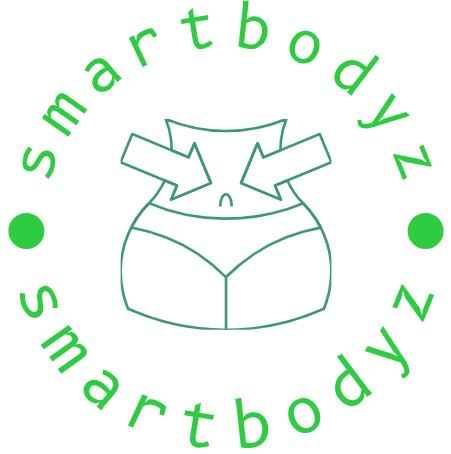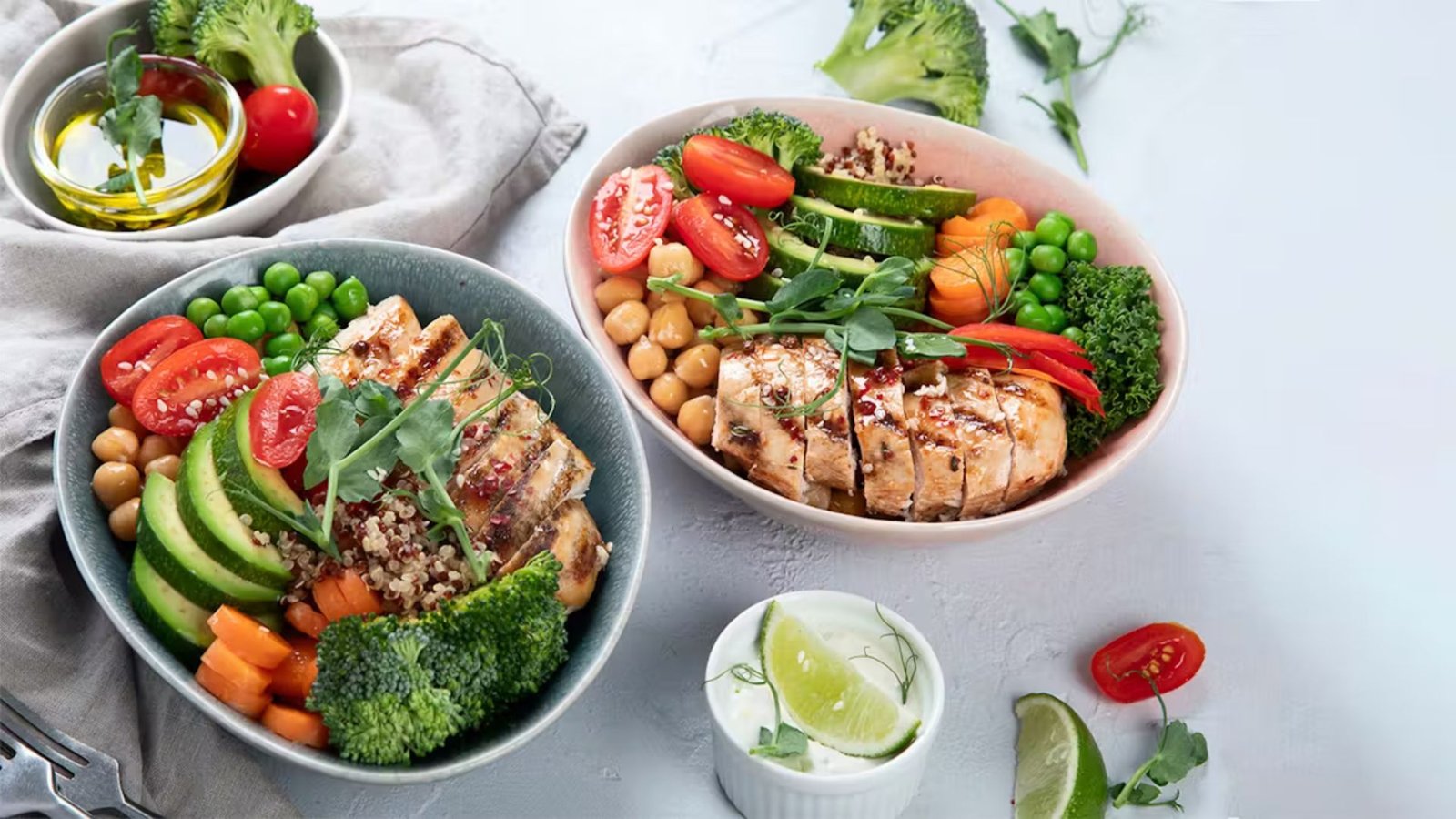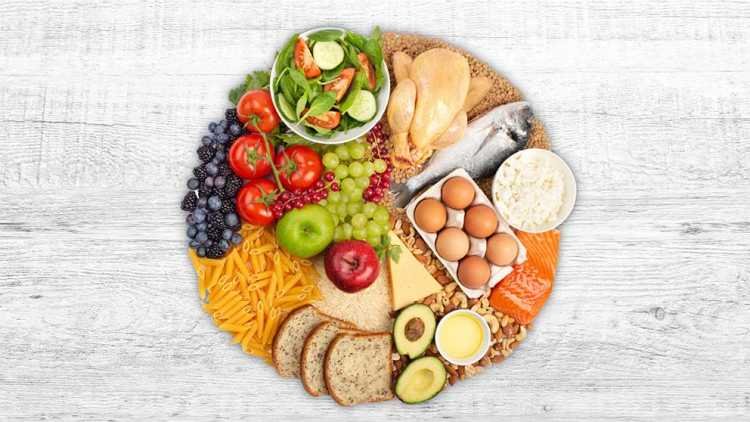When it comes to losing weight, what you eat plays a crucial role in achieving and maintaining your goals. Healthy foods that are rich in fiber, protein, healthy fats, and low in refined sugars can help you feel full longer, boost your metabolism, and keep your energy levels stable. These foods support not just weight loss, but also overall well-being. In this article, we’ll explore healthy food that supports weight loss goals. By including these nutrient-dense options in your meals, you’ll nourish your body, reduce cravings, and maintain a healthy, balanced weight.

1. Leafy Greens
Leafy greens, such as spinach, kale, and Swiss chard, are among the healthiest foods you can eat when trying to lose weight. They are incredibly low in calories and packed with fiber, which helps you feel fuller for longer. The high water content in leafy greens also contributes to hydration and helps curb hunger.
Why they support weight loss:
- Low in calories and high in fiber, helping you feel full and satisfied.
- High in vitamins, minerals, and antioxidants to support overall health.
- Hydrating and help with digestion.
How to enjoy:
Add leafy greens to salads, smoothies, soups, or as a side dish to any meal.
2. Whole Grains
Whole grains, such as quinoa, brown rice, oats, and barley, are excellent sources of complex carbohydrates and fiber. Unlike refined grains, whole grains are digested slowly, providing sustained energy and keeping you feeling full longer. They also help regulate blood sugar levels and prevent spikes that can lead to cravings.
Why they support weight loss:
- High in fiber, which promotes satiety and aids in digestion.
- Slow-digesting carbohydrates that provide lasting energy without causing blood sugar spikes.
- Packed with essential nutrients like B vitamins, iron, and magnesium.
How to enjoy:
Use whole grains as a base for salads, bowls, or as a side dish. You can also enjoy whole grain oats as a healthy breakfast option.
3. Lean Proteins
Protein is a key macronutrient for weight loss. It helps build and repair muscles, boosts metabolism, and keeps you feeling full for longer periods. Lean protein sources, such as chicken breast, turkey, tofu, fish, and beans, are low in fat and calories while providing essential amino acids that your body needs.
Why they support weight loss:
- Helps control hunger by increasing feelings of fullness.
- Boosts metabolism and promotes muscle growth, which helps burn more calories.
- Lean proteins are lower in fat and calories, making them a great option for weight management.
How to enjoy:
Grill, bake, or sauté lean protein sources and add them to salads, wraps, or bowls. Fish and tofu can also be used in soups and stir-fries.
4. Nuts and Seeds
Nuts and seeds, such as almonds, walnuts, chia seeds, and flaxseeds, are excellent sources of healthy fats, protein, and fiber. Although they are calorie-dense, they help curb hunger and provide essential nutrients that support overall health. Just be mindful of portion sizes, as nuts and seeds are energy-dense.
Why they support weight loss:
- Healthy fats in nuts and seeds promote satiety and help control hunger.
- Rich in fiber, which aids digestion and helps maintain steady blood sugar levels.
- Packed with protein to support muscle development and boost metabolism.
How to enjoy:
Snack on a small handful of nuts, sprinkle chia or flaxseeds on your smoothie, or use them in salads, baked goods, or energy bars.
5. Greek Yogurt
Greek yogurt is a protein-packed dairy option that is also rich in probiotics, which support gut health. It’s thicker and more filling than regular yogurt, making it an excellent choice for a satisfying snack or breakfast. Choose plain, unsweetened Greek yogurt to avoid added sugars.
Why it supports weight loss:
- High in protein, which helps control appetite and supports muscle maintenance.
- Contains probiotics that aid in digestion and promote gut health.
- Low in calories and versatile in various recipes.
How to enjoy:
Enjoy Greek yogurt with fresh berries, chia seeds, or a drizzle of honey. You can also use it as a base for smoothies or substitute it for sour cream in savory dishes.
6. Berries
Berries, such as blueberries, strawberries, raspberries, and blackberries, are nutrient-dense and low in calories, making them ideal for weight loss. They are packed with fiber, antioxidants, and vitamin C, all of which help reduce inflammation, support metabolism, and regulate blood sugar levels.
Why they support weight loss:
- High in fiber, which helps you feel full and satisfied.
- Low in calories, making them a great option for satisfying your sweet tooth without derailing your goals.
- Packed with antioxidants and vitamins that support overall health.
How to enjoy:
Add berries to your oatmeal, smoothies, yogurt, or salads. They also make a delicious snack on their own or as a topping for desserts.
7. Avocado
Avocado is a nutrient-rich fruit that is high in monounsaturated fats, which promote heart health and satiety. While high in calories, the healthy fats in avocado help curb cravings and reduce the urge to overeat. It also contains fiber, which aids in digestion and promotes a feeling of fullness.
Why it supports weight loss:
- Healthy fats in avocado help keep you full and satisfied for longer.
- High in fiber, which aids digestion and promotes healthy bowel movements.
- Helps maintain stable blood sugar levels, reducing cravings.
How to enjoy:
Add avocado to salads, toast, wraps, or smoothies. It can also be used as a creamy base for dips like guacamole.
8. Legumes
Legumes, including lentils, chickpeas, black beans, and kidney beans, are excellent sources of plant-based protein and fiber. They are nutrient-dense, low in fat, and have a low glycemic index, making them ideal for supporting weight loss.
Why they support weight loss:
- High in fiber and protein, which help control appetite and keep you full.
- Low in fat and calories, making them a healthy and satisfying addition to meals.
- Support healthy digestion and regulate blood sugar levels.
How to enjoy:
Add legumes to soups, stews, salads, or curries. You can also use them to make homemade veggie burgers or add them to wraps and bowls.
9. Cucumbers
Cucumbers are low in calories but high in water content, making them a great hydrating food that helps control hunger. They are also rich in fiber, which promotes digestion and supports healthy weight management. Their refreshing taste makes them a perfect addition to any meal or snack.
Why they support weight loss:
- High in water content, which helps with hydration and promotes fullness.
- Low in calories, making them a great snack or side dish for weight loss.
- Contains fiber, which supports healthy digestion.
How to enjoy:
Add cucumbers to salads, smoothies, or sandwiches. They can also be sliced and eaten with hummus or as a snack on their own.
10. Green Tea
Green tea is loaded with antioxidants, particularly catechins, which have been shown to boost metabolism and promote fat burning. Drinking green tea regularly can help increase energy expenditure and fat oxidation, making it a great addition to a weight loss plan.
Why it supports weight loss:
- Contains catechins, which boost metabolism and promote fat loss.
- Acts as a natural appetite suppressant, helping reduce cravings.
- Hydrates the body and supports overall well-being.
How to enjoy:
Drink a cup of green tea in the morning or as an afternoon pick-me-up. You can also enjoy iced green tea for a refreshing beverage.
Conclusion
Choosing the right foods to support your weight loss goals is essential for long-term success. The healthy food that supports weight loss goals includes nutrient-dense, whole foods that are rich in fiber, protein, healthy fats, and antioxidants. By incorporating these foods into your daily diet, you’ll not only promote weight loss but also support overall health and well-being.
Remember, sustainable weight loss isn’t about extreme diets or quick fixes—it’s about nourishing your body with wholesome, nutrient-packed foods that fuel your energy, control hunger, and promote healthy metabolism. Make these foods a regular part of your meals, and you’ll be on your way to achieving your weight loss goals in a healthy and balanced way.









